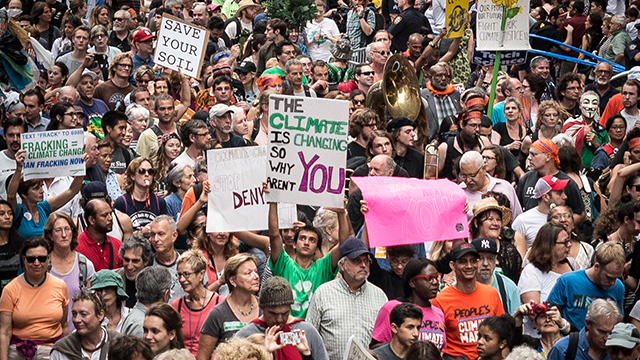This post first appeared at InsideClimate News.

People’s Climate March in NYC, September 21, 2014. (Photo: Annette Bernhardt/flickr CC 2.0)
Concluding that global warming will be a toxic topic in the newly elected Congress, climate movement leaders say they will press for action by state and local authorities while encouraging President Barack Obama to advance his agenda for fighting climate change.
“DC has always been tough ground — the fossil fuel industry owns one party and terrifies the other,” said Bill McKibben, an environmental activist and founder of the climate advocacy organization 350.org. “We’re aware of the hardship, but undaunted.”
Local and regional governments have initiated some of the most aggressive efforts to combat climate change in the US. This has been particularly true in cities, where 80 percent of Americans live. Climate leaders say they will lobby more states, cities and towns to start adaptation programs to stave off the worst effects of global warming, including rising sea levels, increasing temperatures and stronger storms. They also will advocate local and regional measures to reduce carbon dioxide emissions, expand renewable energy and public transit, and toughen building codes.
Scientists warn that unless the world reduces emissions of greenhouse gases soon and slows warming, catastrophic climate change will become a near certainty. This could mean decades or centuries of more intense or frequent droughts, extreme temperatures and wildfires, as well as rising seas. World leaders are to meet in Paris this year to create and commit to a new international accord on fighting global warming.
Climate advocates say a top priority will be defending the Environmental Protection Agency’s proposal to cut carbon emissions from power plants, known as the Clean Power Plan, from both Congressional and state-level attacks. Several conservative groups and Republican leaders have made clear that they intend to dismantle the program.
The American Legislative Exchange Council, a corporate-funded nonprofit set up in the 1970s to push right-wing policies, is preparing state-level legislation that would require state plans for complying with the EPA regulations to be approved by local lawmakers. Such a system would run counter to all previous applications of the Clean Air Act by giving politicians, many of whom receive campaign donations from oil and gas companies, authority to approve how an EPA plan will be implemented. This power typically lies with a state’s environmental agencies.
“This would turn a technical exercise — an economic exercise — into a political exercise, where ideology can trump practical implementation,” said David Doniger, policy director for the Natural Resources Defense Council’s Climate and Clean Air program, during a conference call with journalists in December.
Keystone XL Fight
Grassroots activists and national environmental groups said they will ramp up their six-year fight against the Keystone XL pipeline, a project that has served as the climate movement’s most powerful rallying point for years. The $8 billion pipeline would carry 830,000 barrels a day of carbon-intense tar sands oil from Alberta, Canada, to refineries in Texas. Opponents cite the environmental damage from building it, the risk of toxic spills once in operation and the effect it will have of deepening dependence on fossil fuels at a time when the world needs to cut emissions to combat climate change.
The Nebraska Supreme Court is to rule on a lawsuit challenging whether the governor had the constitutional power to approve the route TransCanada, the foreign energy giant behind the project, will use for the pipeline. If the court rules in favor of the landowners fighting the project, the company will have to apply for building permits through the state Public Service Commission, an often drawn-out process that could delay construction for months.
Obama probably won’t make a decision on granting a presidential permit, necessary because the pipeline crosses an international border, until after the Nebraska Supreme Court rules.
“We have huge support against the pipeline in Nebraska,” said Jane Kleeb, executive director of Bold Nebraska, the grassroots group leading the fight against the pipeline. “People are talking about climate change, and that’s the case in communities across the US. However, there are still pockets of this country who aren’t concerned about it. Maybe they never will. But we are going to try and change that.”
Other grassroots groups say they will continue battling dozens of other pipelines, fracking sites, oil trains and natural gas storage facilities in 2015.
Although Obama has already used his executive authority to launch several climate initiatives, there’s still more he can do, said Michael Brune, executive director of the Sierra Club. In December, the White House announced it was banning oil and gas drilling from the ecologically and culturally rich Bristol Bay in Alaska. There are more areas in the Arctic where the president could cancel oil-drilling leases.
Obama also could put strong regulations in place for methane pollution coming from hydraulic fracturing sites, areas where sand, water and chemicals are pumped at high pressure into underground geological formations to release oil and natural gas. Heavy-duty truck emission standards still need to be finalized, Brune said.
“Our top priority is to have the president complete his environmental legacy, to deliver on the promises that he made,” Brune said. “There is a huge amount of authority that is not yet being utilized or fully utilized by the administration that could have a big impact on almost every sector of the economy.”
A White House official told InsideClimate News that Obama has every intention of continuing his climate agenda and using his executive authority to effect change. “We know that there will be attempts to impede or scale back our actions,” the White House official said. “We will continue to move forward on this vital issue.
“We’re confident we can prevail.”
A New Message
Over the past few years, climate action advocates have recruited activists and driven policy decisions by relying largely on the moral argument for fighting global warming — that action is necessary to protect people from the worst impacts of climate change. Now it’s time for the movement to put more emphasis on the economic benefits of climate initiatives and the increasing economic risks of failing to slow warming, Brune said.
“The moral argument for climate action is very compelling, but at the same time, the benefits of a transition are also becoming more clear,” Brune said. “Fighting climate change is something we have to do, but also something we get to do. It is an opportunity as well as an obligation.”
Electricity generation from solar power doubled in 2014, according to the US Energy Information Administration. Total renewable energy, excluding hydroelectric, grew nearly 10 percent. The industry’s expansion gives environmental leaders concrete examples of communities that have benefited from job creation and reduced power costs because of renewable energy sources.
Thinking Ahead
Leaders of the Republican-led 114th Congress have said they will start work immediately on reversing measures the US has taken to combat climate change. Many of the Republican lawmakers who won election in November ran on a platform of dismantling Obama’s climate policies, which they framed as needless job killers. Sen. Jim Inhofe of Oklahoma, Congress’ leading climate change denier, is set to lead the Senate Environment and Public Works Committee, one of the main panels charged with shaping climate policy.
But the GOP is also in a bind — one that may moderate the party’s planned attack on climate action.
Republican leaders have increasingly acknowledged in recent years that the GOP can’t win the White House in 2016 without securing youth, minority and moderate voters — most of whom polls show support climate action. And while global warming failed to sway this year’s elections, environmental leaders will spend the next two years and millions of dollars trying to make it more of an issue for 2016. What happens over the next two years will become political fodder in the next presidential election.
There’s already been a slight shift in rhetoric by Republican lawmakers. Several of those who just a few years ago argued that climate change was a “hoax” or “scientific scam” are now simply saying, “I’m not a scientist.” Some Republican strategists and commentators are beginning to call for a more dramatic change on the issue.
“If Republicans insist on listening to those that believe we won’t see the effects of climate change for decades, we are setting ourselves up for a political and a policy mistake that will damage the party, and more importantly, the country,” wrote Alex Lundry, vice president of the conservative polling firm Target Point Consulting, in an op-ed earlier this year for the conservative news site The Daily Caller.
Republished with permission of InsideClimate News, a non-profit, non-partisan news organization that covers energy and climate change — plus the territory in between where law, policy and public opinion are shaped.


